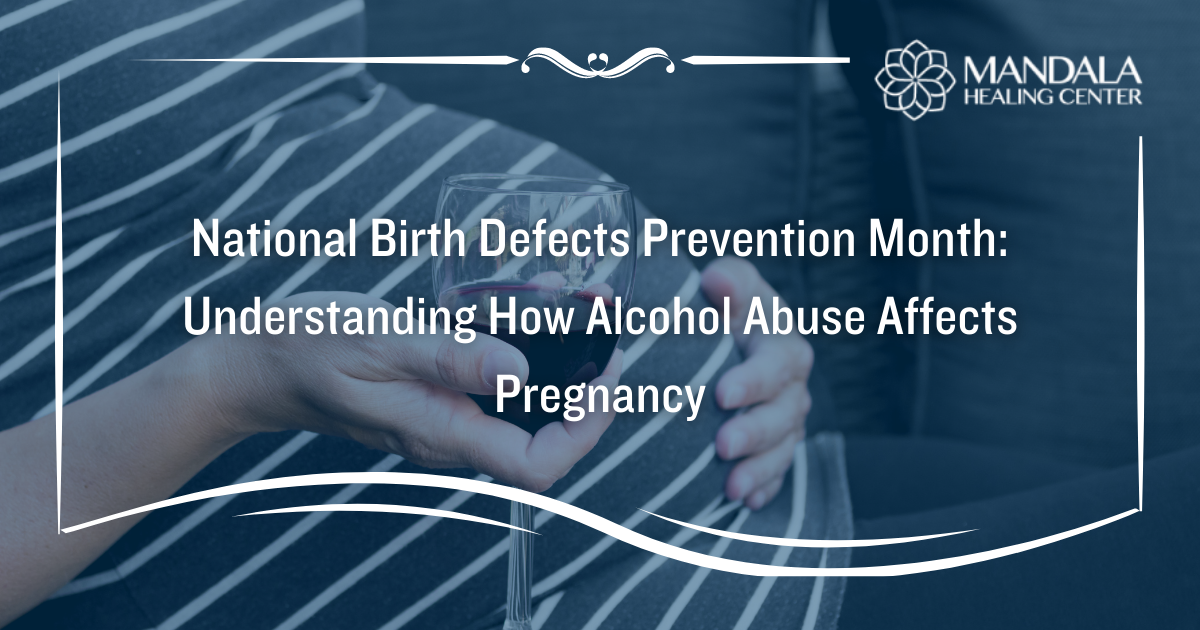January is National Birth Defects Prevention Month. During this important time, the National Birth Defects Prevention Network teams up with other health organizations to spread awareness about the risks of drinking alcohol during pregnancy.
Any problems during pregnancy can be devastating. The National Birth Defects Prevention Network works to bring awareness about the best ways to prevent birth defects, including avoiding drugs and alcohol. The organization strives to encourage people to take care of themselves during pregnancy and do everything they can to ensure a healthy pregnancy.
According to the CDC, there is no amount of alcohol that is safe during pregnancy.[1] Doctors and medical staff communicate this message during all prenatal visits and there are many advertising campaigns designed to bring awareness to this important topic. However, about one in ten women report drinking alcohol during pregnancy.
If you or someone you love are pregnant and drink alcohol, you must get the information and support you need to stop. You can celebrate National Birth Defects Prevention Month by learning about the effect of alcohol abuse on pregnancy and sharing this information.
Is Alcohol Abuse During Pregnancy Common?
The research and advice from the CDC and other health organizations are clear: no amount of alcohol is safe during pregnancy. However, many people choose to drink during pregnancy. In some cases, people may have an unhealthy relationship with alcohol before becoming pregnant that remains untreated during this time. In others, people may be unaware of how seriously alcohol use or abuse can affect the baby.
Research shows that, in the United States, about 1 in 10 women use alcohol during pregnancy.[1] The percentage of women who use alcohol during pregnancy was highest among women 35-44 years old, college graduates, and people without a partner during pregnancy. In this research, alcohol use was defined as having at least one drink in the past 30 days. While having the occasional drink may seem harmless, no amount of alcohol is safe during pregnancy.
The dangers of drinking are even more pronounced when people are drinking heavily during pregnancy. According to research, about 3.1% of people reported binge drinking–four drinks or more in a short period–during pregnancy.[1]
How Does Alcohol Affect Pregnancy?
Research shows that drinking alcohol–and especially drinking heavily–during pregnancy increases the risk of birth defects and other problems. Not all birth defects can be prevented.
However, if you are pregnant, there are some things you can do to increase your chances of having a healthy pregnancy. These include:
- Avoiding drugs, alcohol, and tobacco products during pregnancy
- Getting regular prenatal care
- Taking a prenatal vitamin containing folic acid
Avoiding alcohol is a simple thing you can do to give yourself the best chance at having a healthy pregnancy. No amount of alcohol is considered safe during any stage of pregnancy.
If you are pregnant and struggle with alcohol abuse, you must get the support and treatment you need to have the best chance of having a healthy pregnancy. Before seeking treatment for your alcohol abuse during pregnancy, you must ensure the facility offers specialized treatment for pregnant people.
Why is Alcohol Abuse During Pregnancy Dangerous?
Drinking alcohol during pregnancy can directly affect the way a fetus develops. This is because alcohol is able to pass directly through the mother’s bloodstream through the umbilical cord and into the placenta. Within two hours of consuming alcohol, the fetus will have the same blood alcohol content (BAC) as the mother. Alcohol remains in the fetus’s body longer, meaning that it is exposed to alcohol for an extended period each time the mother drinks.
Alcohol acts as a teratogen–a substance that can lead to birth defects or other complications. During weeks 3-16, most of the fetus’s organs and systems are forming. Alcohol exposure during this point can lead to Fetal Alcohol Syndrome (FAS) or other serious birth defects and abnormalities. After this point, fetal alcohol exposure raises the risk of defects in the spinal cord, eyes, genitals, teeth, and other major organs and systems.[2]
Children who are born with fetal alcohol spectrum disorder (FASD) may have:[3]
- Small size and birth weight
- Facial abnormalities such as small eyes or thin mouth
- Learning problems
- Hyperactive behavior
- Developmental delays, low IQ, or cognitive impairment
- Poor physical coordination
- Vision or hearing problems
- Problems with the heart, kidney, and bones
- Poor reasoning and judgment skills
In the long term, children born with FASD may be at an increased risk of:
- Psychiatric issues
- Unemployment
- Criminal behavior
- Cognitive deficit
There is no safe amount of alcohol during pregnancy. If you or someone you love is pregnant and struggles with alcohol use or abuse, please get support and treatment as soon as possible to have the best chance at a healthy pregnancy.
Learn More About Substance Abuse Treatment at the Mandala Healing Center
Substance abuse and addiction can feel lonely, but you are not alone. If you or someone you love needs substance abuse treatment or support during recovery, reach out to the compassionate staff at the Mandala Healing Center. We offer adaptable, comprehensive alcohol rehab programs designed to empower people as they recover from addiction.
If you are struggling with alcoholism, please reach out to our staff for information about how we can support you in your healing journey. Don’t wait another moment for the treatment and care you deserve. Call to speak with our admissions counselors today.
References:
- https://www.cdc.gov/media/releases/2015/p0924-pregnant-alcohol.html
- https://www.niaaa.nih.gov/publications/brochures-and-fact-sheets/fetal-alcohol-exposure
- https://www.stanfordchildrens.org/en/topic/default?id=alcohol-and-pregnancy-85-P01188












